University and resident doctors at standstill in union demands, with further negotiations scheduled in two weeks.
George Washington University resident doctors Maryssa Miller and Jason Robart, among others, led efforts to form a union among other students. With almost 90% of the residents signed on, they are still negotiating with the university for a fair contract one year later.
“We want the university to know that we are taking this seriously,” Robart, an anesthesiologist resident physician, said. “We are united as a group, and we can mobilize as a group.”
Over 200 unionized resident doctors at George Washington University gathered last week to picket for new contract negotiations, including pay and other benefits.
Residents claim they work up to 80-hour weeks during the academic year and earn as little as $15 an hour. The union is asking for higher wages and better mental healthcare benefits, among other non-economic things such as lactation accommodations.
Hospital residents also claim 51-52% of their take-home pay goes to rent on average, and the university has not helped with increasing costs.
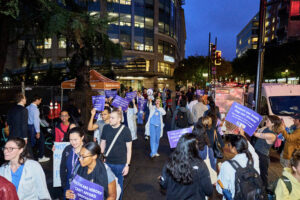
After completing his master’s degree and medical residency at the University of Virginia, Robart began his studies at GW in 2022.
He, along with other residents, decided to form a union because of the extreme working conditions of the program. Residents also argue the impact of their health and well-being could potentially affect patient care.
“We are not asking for the world,” Robart said. “We just want a little bit more to help us take care of ourselves so we can better take care of our patients.”
Nearly 500 medical residents are employed by George Washington University’s School of Medicine and Health Sciences and work in the Foggy Bottom area hospital. The union first set out to organize in March 2023 with the Committee of Interns and Residents (CIR), an organization part of the D.C.-based Service Employees International Union (SEIU).
The union and the university started contract negotiations last fall.
The union voted to officially form in March 2023 and worked with CIR to start contract negotiations.
“Each time we proposed something, [the university] would propose something back that we thought was woefully inadequate,” Robart said.
Union members said the contract negotiations have been taking longer than expected because the university’s bargaining team has not been acting “in good faith.” Residents claim university decision makers do not attend negotiation meetings, only sending their appointed lawyer.
“I feel so morally defeated because I just had to listen to someone who’s never taken care of a patient in their life and never gone through what we go through on a daily basis, tell me why I don’t deserve a higher salary to be able to afford groceries,” Dr. Maryssa Miller, an internal medicine resident physician, said.
Miller, a first-generation college student, also began her residency at GW in 2022. She said the university garnered her interest because of its HIV medicine track and working for “a diverse and underserved population that really needs care.”
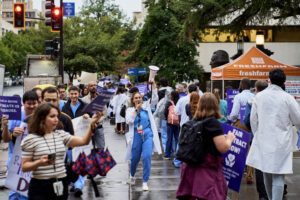
She feels as though the university takes advantage of how she and other residents care about their jobs and their patients. However, she continues to fight for a fair contract because she believes it is in the best interest of future residents and patients.
“We still show up, and we still have a job,” she said. “The university capitalizes on that. I will always make the conscious decision to choose my patients over myself.”
Residents say the built-up tension with the university resulted in a planned picketing last week. Many community members showed up to spread their support to the union and learn more about the cause.
“It was a really cool opportunity to be able to educate the public because there are a lot of misconceptions about residency training,” Miller said. “I think a part of that is the healthcare institution continues to treat us and call us students.”
The GWU Hospital has declined to comment on this story. The university did not respond to multiple requests for comment.
Union members said they have not heard back from the university following Wednesday’s demonstration.
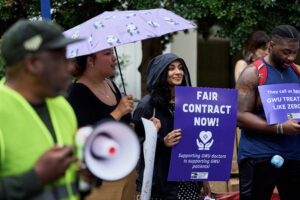
As the next meeting for contract negotiations is set for October 17, residents said they hope the fight does not lead to a strike. Nevertheless, they said they will keep fighting for themselves and the well-being of their patients.
“We have a strong voice and a strong leverage that we can use to make medicine as a career more affordable, more diverse and essentially to look more like the people we’re taking care of in this community,” Miller said.

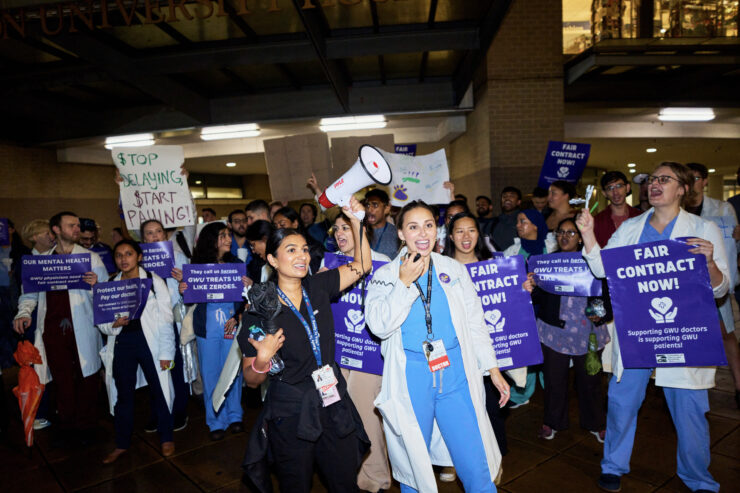
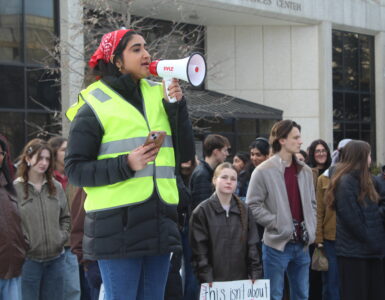












, strike strike strike, y’all. Nothing will change-and patient care will continue to deteriorate-until you stand up for yourselves and your patients. Stop being used victims for the suits. Thsi coming for a physique ho has spent a half century taking care of indirect patients with emergencies, not some concierge cosmetic surgeon. The Stockholm syndrome needs to stop. Stop letting them guilt you. Do you think they feel any ugly when they are “summering” at their beach house on Rehoboth and people are sitting in hallways for days at a time ?no. Either go back to B school or strike. There is no try, just do.
Ridiculous. I work with these residents. There are very very few that work close to 80 hours a week. This will inhibit their training that has already deteriorated as they work less and less.